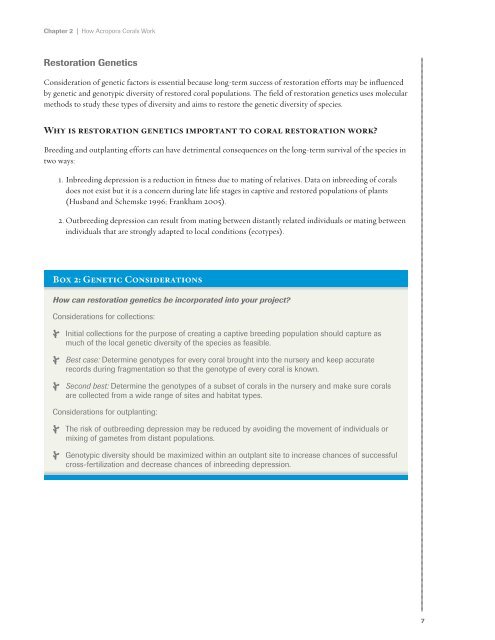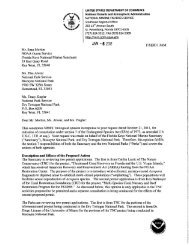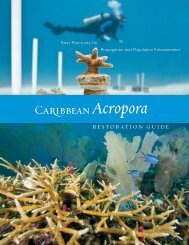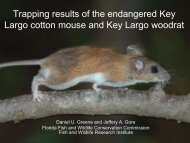Caribbean Acropora Restoration Guide - The Florida Reef ...
Caribbean Acropora Restoration Guide - The Florida Reef ...
Caribbean Acropora Restoration Guide - The Florida Reef ...
Create successful ePaper yourself
Turn your PDF publications into a flip-book with our unique Google optimized e-Paper software.
Chapter 2 | How <strong>Acropora</strong> Corals Work<br />
<strong>Restoration</strong> Genetics<br />
Consideration of genetic factors is essential because long-term success of restoration efforts may be influenced<br />
by genetic and genotypic diversity of restored coral populations. <strong>The</strong> field of restoration genetics uses molecular<br />
methods to study these types of diversity and aims to restore the genetic diversity of species.<br />
Why is restoration genetics important to coral restoration work?<br />
Breeding and outplanting efforts can have detrimental consequences on the long-term survival of the species in<br />
two ways:<br />
1. Inbreeding depression is a reduction in fitness due to mating of relatives. Data on inbreeding of corals<br />
does not exist but it is a concern during late life stages in captive and restored populations of plants<br />
(Husband and Schemske 1996; Frankham 2005).<br />
2. Outbreeding depression can result from mating between distantly related individuals or mating between<br />
individuals that are strongly adapted to local conditions (ecotypes).<br />
Box 2: Genetic Considerations<br />
How can restoration genetics be incorporated into your project?<br />
Considerations for collections:<br />
Initial collections for the purpose of creating a captive breeding population should capture as<br />
much of the local genetic diversity of the species as feasible.<br />
Best case: Determine genotypes for every coral brought into the nursery and keep accurate<br />
records during fragmentation so that the genotype of every coral is known.<br />
Second best: Determine the genotypes of a subset of corals in the nursery and make sure corals<br />
are collected from a wide range of sites and habitat types.<br />
Considerations for outplanting:<br />
<strong>The</strong> risk of outbreeding depression may be reduced by avoiding the movement of individuals or<br />
mixing of gametes from distant populations.<br />
Genotypic diversity should be maximized within an outplant site to increase chances of successful<br />
cross-fertilization and decrease chances of inbreeding depression.<br />
7











